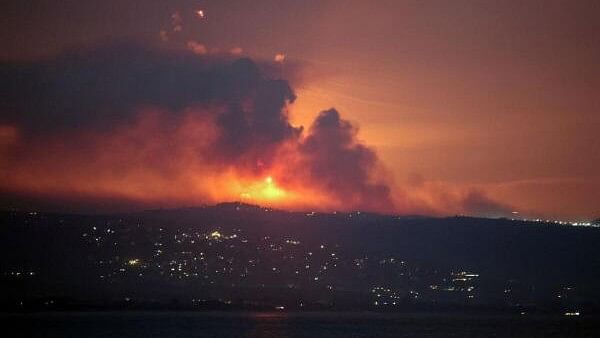
A view shows smoke and fire on the Lebanese side of the border with Israel, after Israel said it had noted armed group Hezbollah preparing to attack Israel and had carried out pre-emptive strikes on Hezbollah targets in Lebanon, as seen from Tyre, southern Lebanon.
Credit: Reuters Photo
Israel and Hezbollah, the Iran-backed armed group in Lebanon, on Sunday engaged in some of their heaviest fighting in months, reviving fears that the region was headed toward a wider conflict.
The Israeli military launched predawn airstrikes at targets in southern Lebanon, saying it was acting preemptively against what it described as an “extensive” attack that Hezbollah was planning on Israeli territory. Hezbollah later said it had fired hundreds of rockets at Israel, in what appeared to be one of its largest rocket barrages yet.
The extent of damage on either side wasn’t immediately clear.
Israel and Hezbollah have regularly traded fire on Israel’s northern border since the war between Israel and Hamas broke out in October — a conflict that has long threatened to engulf the region. Israel has been bracing for a large-scale attack following the assassinations of a top Hezbollah commander and a Hamas leader last month.
“From right next to the homes of Lebanese civilians in the south of Lebanon, we can see that Hezbollah is preparing to launch an extensive attack on Israel, while endangering the Lebanese civilians,” Rear Adm. Daniel Hagari, the Israeli military spokesperson, said Sunday. “We warn the civilians located in the areas where Hezbollah is operating to move out of harm’s way immediately for their own safety.”
The Israeli airstrikes were aimed at the launchers of surface-to-surface missiles in Lebanon that were programmed to be fired at 5 a.m. in the direction of Tel Aviv, Israel, according to a Western intelligence official. The official said all the launchers that were targeted were destroyed and that Israel was anticipating a harsh response from Hezbollah.
The Israeli strikes in Lebanon on Sunday were “the most violent since the beginning of the war” and caused “severe damage” to local infrastructure, including electricity and water networks, according to Lebanon’s state-run news agency. There were no immediate reports of deaths in Lebanon, but at least two people were injured, one of them critically, the agency reported.
In its response, Hezbollah said that it had fired more than 320 rockets at nearly a dozen Israeli military bases and positions, a figure that would make the barrage one of the largest of the war if confirmed. It was not immediately clear whether any of the rockets had hit their targets. The group also said that it had successfully completed the first stage of its attack on Israel in retaliation of the assassination of Fouad Shukur, a senior Hezbollah commander, in late July.
Israel declared a rare state of emergency Sunday and imposed some restrictions on public gatherings. But the fact that it closed the airport in Tel Aviv for only a brief period suggested that it wasn’t expecting any more attacks for the moment.
The wider diplomatic implications of Israel’s predawn strikes were not immediately clear. Negotiators had been expected to gather in Cairo this week for a new round of talks for a potential cease-fire in Gaza, even as fighting has raged in the enclave and on Israel’s northern border.
Concerns of a wider conflict in the region have been elevated in recent weeks, following the assassinations of Shukur, and Hamas’ political leader, Ismail Haniyeh, who was killed July 31 during a visit to Tehran, Iran. Israel claimed responsibility for the airstrike on Shukur in the Beirut suburbs, but has remained silent about the other killing.
The leader of Hezbollah, Hassan Nasrallah, declared that his group’s conflict with Israel had entered a new phase after Israel assassinated the Hezbollah commander last month. Israel has also been expecting a response from Iran, but did not mention Iran in its statement Sunday.
Still, it warned other rivals not to join the conflict.
“Hezbollah’s ongoing aggression risks dragging the people of Lebanon, the people of Israel — and the whole region — into a wider escalation,” Hagari said. “We are operating in self-defense from Hezbollah, and any other enemy that joins in their attacks against us — and we are ready to do everything we need to defend the people of Israel.”